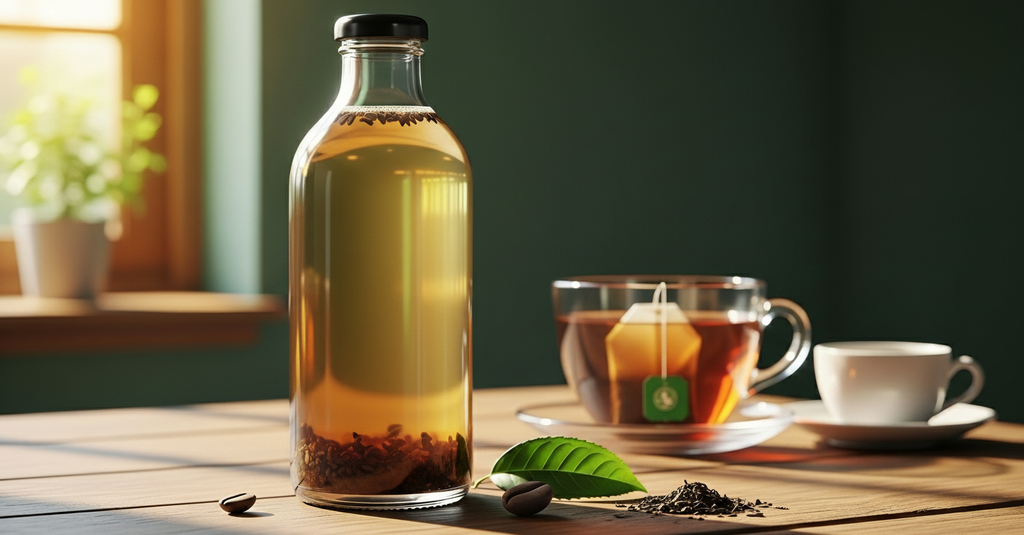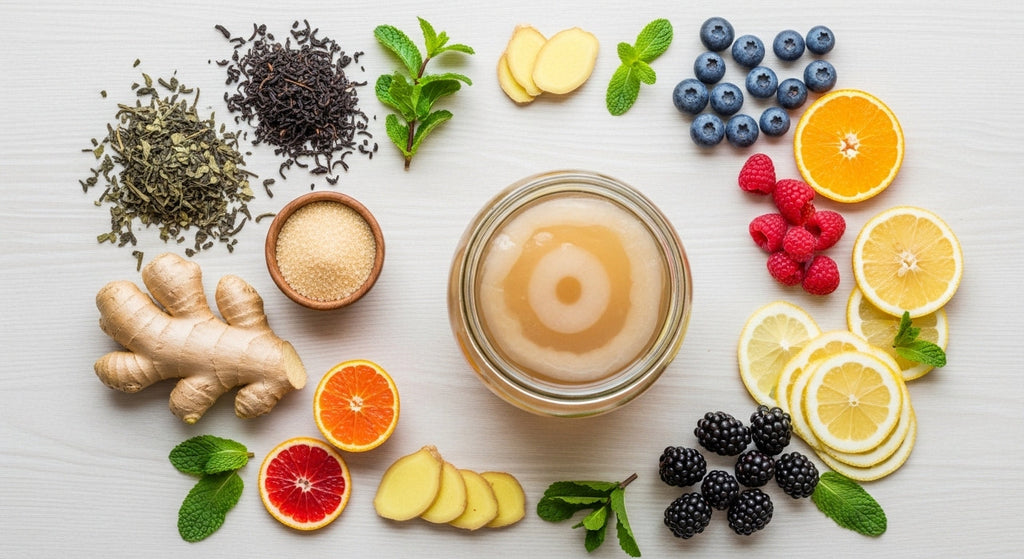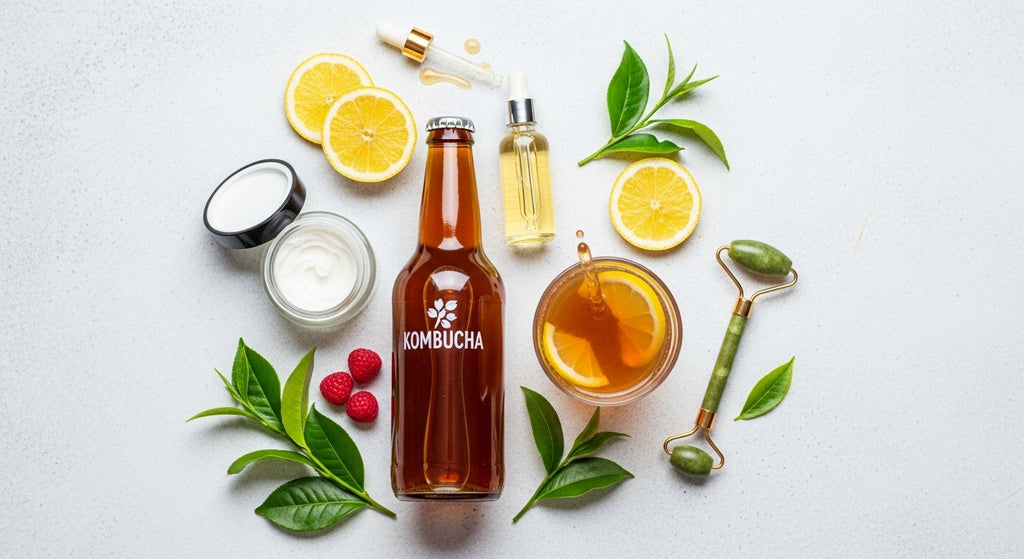
Does Kombucha Have Caffeine? How Much Caffeine is in Kombucha?

Does Kombucha Have Caffeine? How Much Caffeine is in Kombucha?
If you’ve ever wondered whether kombucha contains caffeine, the simple answer is yes – but only a small amount. Kombucha is typically made using black or green tea, and both of these teas come from the Camellia sinensis plant, which naturally contains caffeine. However, during fermentation, some of that caffeine is broken down by the yeast and bacteria, so the final drink has significantly less caffeine than the original tea.
Why does kombucha have caffeine? It all comes down to the tea. When you make kombucha, you start with sweetened tea, and while the fermentation process alters many components, the caffeine in the tea isn’t completely removed. The SCOBY (symbiotic culture of bacteria and yeast) might reduce some caffeine, but the rest stays in the drink. Importantly, no additional caffeine is added during the process.
How Much Caffeine Does Kombucha Have?
The caffeine content in kombucha is quite low. On average, an 8-ounce (240 ml) serving has about 10 to 15 milligrams of caffeine. This number can vary depending on the type of tea used, how long it’s fermented, and the brand of kombucha. For comparison:
-
A regular cup of black tea (8 oz) has around 40–50 mg of caffeine.
-
Green tea contains about 30 mg per cup.
-
A cup of coffee (8 oz) has roughly 95 mg or more, depending on how it’s brewed.
So, an 8-ounce serving of kombucha contains roughly one-fifth to one-third the caffeine of tea and about one-tenth the amount found in coffee. Some analyses show kombucha contains approximately 1–2 mg of caffeine per ounce, whereas coffee contains around 11–12 mg per ounce.
To put it into perspective, you’d need to drink six to eight bottles of kombucha to match the caffeine in a single cup of coffee. (That’s not advisable, both because of the sugar content and practicality.)
Why Kombucha Has Low Caffeine Levels
There are a couple of reasons why kombucha’s caffeine content is so low:
-
Tea Selection: Many kombucha brewers use green tea or a mix of green and black tea. Green tea generally has less caffeine than black tea. For example, Dad’s Hack kombucha uses green tea, which helps keep the caffeine content down.
-
Fermentation Process: Fermentation plays a key role in lowering caffeine. Microbes in the SCOBY can metabolize some of the caffeine during fermentation. Studies suggest fermentation can cut caffeine content by 20% to 50%. The longer the kombucha ferments, the lower the caffeine – and also the lower the sugar, which is why long-fermented kombucha has a tangier taste.
One kombucha brewer even notes, “Fermentation reduces the caffeine levels to negligible levels. A Coke or Pepsi would have more caffeine in comparison.” A typical can of cola contains about 35 mg of caffeine, which is two to three times more than kombucha.
Kombucha’s Caffeine Effects – Boost Without the Buzz?
People often ask whether kombucha’s caffeine provides an energy boost. The caffeine content is generally too low to cause jitters or insomnia, even if consumed later in the day. However, many people report a subtle increase in alertness. This is likely due to the combination of low caffeine, natural sugar, and B vitamins formed during fermentation.
Unlike the sharp buzz of coffee, kombucha gives a gentler lift. Wellness experts note that kombucha offers a more balanced energy boost – without the crash – thanks to its tea base, vitamins, and trace amounts of iron.
Tips for People Sensitive to Caffeine
If you’re trying to limit or avoid caffeine, here are some suggestions:
-
Start Small: Try a smaller serving (4 oz) first to see how your body reacts.
-
Drink Earlier: If you’re concerned about sleep, have it earlier in the day.
-
Choose Decaf Versions: Some kombucha brands make caffeine-free options using decaf tea or herbal tea. Always check the label.
-
Brew at Home with Herbal Tea: If you make your own kombucha, try blending herbal teas (like chamomile or hibiscus) with a bit of green tea to reduce caffeine. The SCOBY needs some real tea to stay healthy.
-
Mind the Serving Size for Kids: Even though the caffeine is low, it’s something to consider for children, especially due to the trace amounts of alcohol (usually under 0.5%). A few sips occasionally are fine, but a full bottle daily isn’t recommended for young kids.
Generally, unless you’ve been advised to completely avoid caffeine for medical reasons, kombucha’s caffeine content is low enough to be safe for most people. Pregnant or breastfeeding individuals should consult a healthcare provider, though moderate amounts are usually considered okay.
Enjoy Kombucha with Less Caffeine
Kombucha can be a great choice if you’re looking to cut back on caffeine but still want a refreshing, slightly energizing drink. Instead of grabbing another coffee or soda, reach for a bottle of kombucha. It’s fizzy, flavorful, and can satisfy that craving – without the high caffeine or sugar.
Conclusion: A Mild Brew with a Gentle Boost
Yes, kombucha contains caffeine, but only a little – about as much as a decaf coffee or less. For most people, it’s a safe and refreshing alternative to highly caffeinated drinks. You’ll still get a gentle lift from the natural ingredients, without the crash or jitters.
So feel free to enjoy kombucha as your go-to afternoon drink. It hydrates, refreshes, and even gives a small energy perk. As always, listen to your body and adjust your intake if needed.
Thinking of making the switch? Try Dad’s Hack Kombucha – brewed with green tea and crafted for flavor and balance. With a subscription option and a variety of exciting blends, it’s easy to keep your fridge stocked. Order online and enjoy a delicious, low-caffeine drink that supports wellness. Whether for yourself or as a gift, Dad’s Hack is a great choice for health-conscious sippers.




